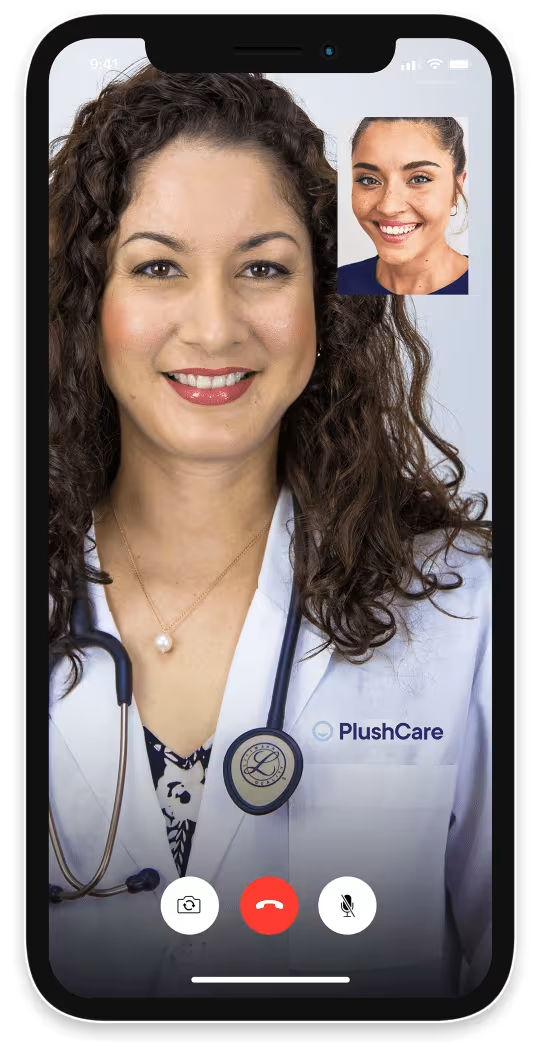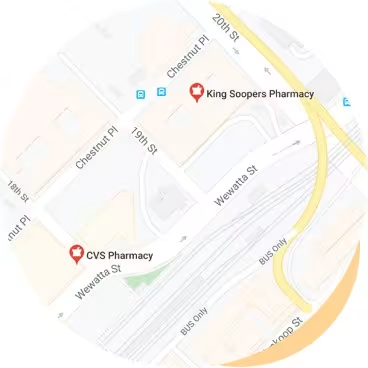
Learn about meningitis
Meningitis is the swelling of the protective membranes covering the brain and spinal cord and can affect anyone. A bacterial or viral infection of the fluid surrounding the brain and spinal cord usually causes the swelling. However, injuries, cancer, certain drugs, and other types of infections also can cause meningitis. Viral meningitis is the most common and least serious type of meningitis, and lasts between 7-10 days.
Meningitis causes
There are two types of meningitis: bacterial and viral.
Bacterial infections
Bacterial meningitis occurs when bacteria enter your body through your sinuses, throat, or ears. The bacteria then travel through your bloodstream and into your brain. Since meningitis goes to your brain, it is important to be aware of it as soon as possible so you can treat it.
Three types of bacteria are responsible for 80% of all bacterial meningitis. These are Hemophilus influenzae (type B), Streptococcus pneumoniae (Pneumococcus), and Neisseria meningitidis (Meningococcus).
Viral infections
Viral meningitis is caused by a group of viruses known as enteroviruses. It is more common than bacterial meningitis and, usually, less serious. The viral form can develop from a variety of different illnesses, including many that cause diarrhea.
Viruses such as herpes simplex virus, HIV, mumps virus, West Nile virus and others also can cause viral meningitis.
Meningitis symptoms
Meningitis symptoms can show up anywhere from hours to a few days after being exposed. In the beginning, symptoms may seem similar to influenza. However, other symptoms will begin showing, including:
Sudden high fever
Stiff neck
Severe headache
Nausea and vomiting
Confusion
Seizures
Difficulty walking
Sensitivity to light
No appetite or thirst
Skin rash
When infants have meningitis, their symptoms may differ from those of older people, so it is important to know what to look for if there is a baby in your life. Some of these symptoms include:Overly sleepy, sluggish or inactive
Constant crying that gets worse when you hold the baby
Stiff neck or body
A bulging area on the soft spot of the baby’s head
Inability to feed

How to treat meningitis
Treatment for meningitis depends on the type of meningitis you have. Let’s look at the treatment plans for bacterial meningitis and viral meningitis.
Bacterial meningitis
Bacterial meningitis is a serious condition and needs to be treated immediately. Treatment for bacterial infections usually includes antibiotics as well as corticosteroids. Quick treatment will help reduce the risk of seizures and other adverse effects of bacterial meningitis. Depending on the severity of your infection, your doctor may also drain areas of your sinuses behind your ear to help relieve pain as well as help reduce the chances of a secondary infection. Acute bacterial meningitis, or simply acute meningitis, may develop if not promptly treated.
Viral meningitis
Since viral meningitis is caused by a viral infection and not bacteria, antibiotics are not an option for treatment. For mild cases, your doctor will likely prescribe a regimen of rest, fluid, and over-the-counter pain medications while you wait for the virus to run its course. However, if you are suffering from viral meningitis due to a herpes virus, there is an antiviral medication that is available for you to take if your doctor deems this necessary.
Medication for meningitis
Medications for meningitis will depend on what type of meningitis you are diagnosed with. Other than those prescriptions, people with meningitis can take over-the-counter pain medications to help control the pain levels while they wait for the meningitis to clear up. Your doctor may prescribe just one of these medications or a combination of a few, depending on your personal situation.
Antibiotics
Antibiotics will be prescribed for bacterial meningitis because they will help kill the bacteria causing the illness.
Corticosteroids
Corticosteroids can be given to help relieve swelling in the brain, and these can be given for both types of meningitis if your doctor deems necessary. You can also take an anticonvulsant medication if you need to prevent seizures.

How to prevent meningitis
The best way to prevent meningitis of all types is to practice good hygiene habits. Wash your hands regularly, cover your mouth when you cough or sneeze, and stay home if you are not feeling well. In addition, do not share food or drinks with others and take special precautions when you are taking care of someone who is sick.
Some forms of bacterial meningitis have a vaccination you can get in order to help prevent an infection. Depending on your age, there are a few vaccinations that have been approved for bacterial meningitis prevention:
Haemophilus influenzae type b (Hib) vaccine: This is given starting at two months old. This is also recommended for certain adults with risk factors such as sickle cell disease, AIDS, or those without a spleen.
Pneumococcal conjugate vaccine (PCV13): The first dose is given under two years old, and then boosters are recommended between two and five years old if the child has a compromised immune system.
Pneumococcal polysaccharide vaccine (PPSV23): This is given to older children and adults who are at risk for bacterial meningitis infections. The CDC recommends that all adults older than 65 receive this vaccination.
Meningococcal conjugate vaccine: A single dose should be given to children between 11 and 12 years old, and then they should receive a booster at 16. If the shot is given between 13 and 15, the booster should be received between 16 and 18. If the first dose is given after 18 years old, there is no booster necessary.

When to see a doctor for meningitis
You should seek immediate medical care if you or someone in your care is showing symptoms of meningitis, including a high fever, stiff neck, or confusion. Bacterial meningitis is a very serious condition that can turn deadly in a matter of days if not treated.
It is better to be proactive and overly cautious when it comes to meningitis symptoms.
Meningitis treatment FAQs
What is the best treatment for meningitis?
The best treatment for meningitis depends on each individual case. Some treatments include prescription medications, while others may only require rest and extra fluids. Talking to a doctor is the best way to determine the right treatment for you.
What is the best medication for meningitis?
Again, this depends on the type of meningitis you have. Bacterial meningitis reacts well to antibiotics, but they will not work for viral meningitis. Viral meningitis can only have symptoms treated, including using over-the-counter pain medication.
Is viral meningitis contagious after treatment?
Yes, viral meningitis can continue to be contagious after treatment. In fact, you can continue to infect others for up to a few weeks after you begin feeling better. That is why it is so important to wash your hands and practice good hygiene.
Can you survive meningitis without treatment?
Most cases of viral meningitis are mild and will clear on their own, even if you don’t treat them. However, bacterial meningitis is much more serious and likely will not clear on its own. This is why seeking a doctor is so important, so you can confirm which type you have and get the treatment necessary.
How long does meningitis last?
Viral meningitis typically lasts between seven and ten days. However, bacterial meningitis must be cleared by antibiotics. The time it takes for the antibiotics to clear the infection will be different for every person, as each person’s system reacts differently to the treatment.
Is meningitis easily treatable?
When caught early, meningitis is fairly easy to get under control and treat. However, if left untreated, bacterial meningitis can cause other complications, which will make treatment much harder or not fully plausible. Remember that early prevention and treatment is key to disease control, which is all the more reason to reach out to a doctor if you suspect you have meningitis.
3 simple steps to request an evaluation for meningitis today

Step 1
Book a meningitis evaluation appointment.
Book a same day appointment from anywhere.

Step 2
Talk to your medical provider regarding your meningitis symptoms.
Visit with a doctor on your smartphone or computer.

Step 3
Pick up a prescription to treat meningitis, if prescribed.
We can send prescriptions to any local pharmacy.
Related conditions to meningitis
Certain viruses and conditions can result in complications that cause meningitis. These include:
HIV
Mumps
Meningitis treatment pricing details
How pricing works
To request meningitis treatment and get a new prescription or refill on your prescription, join our monthly membership and get discounted visits.
Paying with insurance
Membership
$16.99/month
First month free
Visits
Copay
30 days of free membership
Same-day appointments 7 days a week
Unlimited messages with your Care Team
Prescription discount card to save up to 80%
Exclusive discounts on lab tests
Free memberships for your family
Cancel anytime
Visit price with insurance
Often the same as an office visit. Most patients with in-network insurance pay $30 or less!
We accept these insurance plans and many more:
Paying without insurance
Membership
$16.99/month
First month free
Visits
$129
30 days of free membership
Same-day appointments 7 days a week
Unlimited messages with your Care Team
Prescription discount card to save up to 80%
Exclusive discounts on lab tests
Free memberships for your family
Cancel anytime
Visit price without insurance
Initial visits are $129.
If we're unable to treat you, we'll provide a full refund.
Meningitis treatment resources
Sources:
PlushCare is dedicated to providing you with accurate and trustworthy health information.
Mayo Clinic. Meningitis. Accessed on May 23, 2022, https://www.mayoclinic.org/diseases-conditions/meningitis/symptoms-causes/syc-20350508
KidsHealth. Meningitis. Accessed on May 23, 2022, https://kidshealth.org/en/parents/meningitis.html
WebMD. Understanding Meningitis Basics. Accessed on May 23, 2022, https://www.webmd.com/children/understanding-meningitis-basics
Medical News Today. Meningitis. Accessed on May 23, 2022, https://www.medicalnewstoday.com/articles/9276
MedlinePlus. Meningitis. Accessed on May 23, 2022, https://medlineplus.gov/meningitis.html
PlushCare content is reviewed by MDs, PhDs, NPs, nutritionists, and other healthcare professionals. Learn more about our editorial standards and meet the medical team. The PlushCare site or any linked materials are not intended and should not be construed as medical advice, nor is the information a substitute for professional medical expertise or treatment.